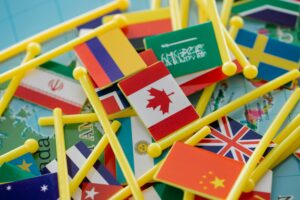Citizenship by naturalization is the legal process through which a foreign national acquires the nationality of a country after fulfilling certain residency, language, and cultural integration requirements.
In countries like Canada and Germany, naturalization is a well-defined path with predictable timelines and requirements.
Here’s how different countries approach naturalization and what it takes to qualify.
In this guide, we will explore:
- The easiest countries to naturalize;
- Hardest countries to naturalize;
- Muslim countries with naturalization pathways;
- Countries without dual citizenship, and the
- Difference between naturalization and registration
My contact details are hello@adamfayed.com and WhatsApp +44-7393-450-837 if you have any questions.
The information in this article is for general guidance only. It does not constitute financial, legal, or tax advice, and is not a recommendation or solicitation to invest. Some facts may have changed since the time of writing.

What Is Citizenship by Naturalization?
Citizenship by naturalization allows individuals who were not born citizens to acquire nationality after meeting specific legal conditions.
It usually involves:
- A minimum period of legal residency
- Demonstrated integration into society (language, culture, values)
- A clean criminal record
- Formal application and approval by government authorities
Naturalized citizens generally enjoy the same rights as citizens by birth, including the right to vote, work without restrictions, and obtain a passport.
Which country has the easiest naturalization process?
Argentina
Argentina offers one of the shortest naturalization timelines in the world.
Foreign nationals can apply for citizenship after just two years of legal residency, regardless of nationality or language background.
Permanent residency isn’t required; just proof of uninterrupted physical presence.
Note: The applicant must have a clean criminal record and prove ties to the country (job, rent, etc.), but no language test is required.
Uruguay
Citizenship in Uruguay is available after 3 years of residency for married individuals with Uruguayan spouse or children or 5 years for single applicants. There is no language test, and dual citizenship is allowed.
Uruguay’s flexible process and political stability make it a favored destination for expats seeking a South American passport.
Paraguay
Paraguay allows naturalization after just 3 years of residency.
However, in practice, applicants must often demonstrate cultural integration and financial ties to the country.
Dual citizenship is allowed if there is a bilateral treaty.
Countries with Standard or Moderate Requirements
Canada
To become a Canadian citizen by naturalization, you must have:
- Lived in Canada for at least 3 years (1,095 days) in the last 5 years
- Filed taxes for at least 3 years
- Passed a citizenship test on Canadian rights, responsibilities, and history
- Demonstrated English or French language proficiency
Canada recognizes dual citizenship and offers one of the world’s strongest passports.
United States
In the US, you can apply for naturalization after:
- 5 years of permanent residency (or 3 years if married to a US citizen)
- Demonstrating continuous residence and physical presence
- Passing the English and civics test
- Showing good moral character and allegiance to the US Constitution
The US allows dual citizenship in practice, though it is not formally encouraged.
United Kingdom
The UK requires:
- 5 years of lawful residence, plus 1 additional year as a permanent resident
- Knowledge of English and life in the UK (via a test)
- No serious immigration or criminal violations
- A formal application and naturalization ceremony
Dual citizenship is allowed.
Countries with Stricter Naturalization Rules
Switzerland
Switzerland has one of the most stringent naturalization processes:
- 10 years of residency (with integration into Swiss society)
- Demonstrated language proficiency in a national language
- A clean legal record and local community approval
- Naturalization is partly managed by cantonal and municipal authorities
Japan
Japan requires 5 years of continuous residence, language proficiency, and renunciation of other citizenships. Dual nationality is not allowed, making Japan’s process less attractive for those seeking to retain their original passport.
Austria
Austria generally requires 10 years of residency, strict integration requirements, and proof of stable income. It does not allow dual citizenship, except in very limited cases.
Muslim-Majority and Gulf Countries: Highly Restricted Naturalization

Many Middle Eastern nations make naturalization extremely difficult, especially for non-Arabs:
- Saudi Arabia: Naturalization is tightly controlled and granted only in exceptional circumstances. Foreign applicants must typically have at least 10 consecutive years of legal residency, demonstrate fluency in Arabic, have clean criminal records, and contribute significantly to the economy or culture. Only individuals in niche categories such as professionals aligned with Vision 2030 goals, are considered, often via a ministerial or royal decree. Dual citizenship is generally not allowed, although rare exceptions do exist.
- UAE: Since 2021, the UAE introduced a merit-based naturalization route targeting investors, highly skilled professionals, scientists, and creatives. However, this is not an open citizenship-by-investment scheme; applicants must be formally nominated by government authorities.
- Arabs from GCC states may be eligible after 3 years of residence, others after 7 to 30 years, depending on origin and conditions.
- Dual citizenship is permitted in select cases under this merit-based program.
- Kuwait, Oman (and similar Gulf countries): These countries offer almost no practical path to citizenship for expatriates.
- Kuwait in particular is known for arbitrary and opaque implementation of citizenship laws; naturalization is rare, with little public transparency or eligibility criteria. In 2025, Kuwait has reportedly revoked citizenship from 42,000 people, mainly in politically motivated cases. Dual nationality is not accepted.
EU Countries with Naturalization Pathways
- Requires 5 years of residence
- B1-level German language
- No serious criminal offenses
- Sufficient financial support
Portugal
- Portugal is no longer a 5‑year naturalization pathway country for most applicants, and the rules have recently undergone significant reform. According to proposed and pending legislation passed in June 2025:
- Most non‑CPLP nationals (i.e. those not from Portuguese‑speaking countries) now require 10 years of legal residency before applying for citizenship. Applicants from Portuguese-speaking countries (e.g. Brazil, Angola, Mozambique) benefit from a reduced residency period of 7 years.
- New legislation mandates a Portuguese language test (minimum A2 level) and a civic knowledge test covering Portuguese culture, values, and democratic principles.
- Dual citizenship is allowed
- Very popular with retirees, investors, and expats
Spain
- 10 years of residency normally required
- Only 2 years for citizens of Latin America, Andorra, the Philippines, Portugal, persons of Sephardic origin, or Equatorial Guinea
- Spanish language proficiency required
- Dual citizenship permitted only for select countries
Countries That Do Not Allow Dual Citizenship
- Japan – Requires citizens to choose one nationality before the age of 22.
- Singapore – Prohibits dual citizenship; acquiring another nationality results in loss of Singaporean citizenship.
- India – Does not allow dual citizenship. Indian citizens who acquire another nationality must renounce their Indian citizenship, though an Overseas Citizenship of India (OCI) scheme exists.
- Austria – Generally does not allow dual citizenship, except in rare cases such as for children born with multiple nationalities or when explicitly granted permission.
- Netherlands – Does not allow dual citizenship in most cases, but has exceptions (e.g., for those born with multiple nationalities or who are married to Dutch citizens).
- China – Does not recognize dual nationality under any circumstances.
- Indonesia – Does not allow dual citizenship for adults; however, children born with multiple nationalities must choose one before age 21.
- Saudi Arabia – Technically does not allow dual citizenship, though enforcement is inconsistent and high-ranking officials may hold more than one passport under special circumstances.
- Germany – Does not generally allow dual citizenship unless within the EU or with special exemptions (e.g., born with two nationalities or unable to renounce original citizenship).
- Ukraine (Changed)– Ukraine now legally allows dual and multiple citizenship for eligible individuals, provided their other nationality is from a friendly state and they meet language and residence criteria as defined by the 2025 law.
- Norway (Changed)– This used to be true, but as of 2020, Norway now allows dual citizenship.
Why Do Foreigners Apply for Naturalization?
- Security and Permanence: Many immigrants seek naturalization to gain a secure legal status in the country they’ve called home for years. For example, after fleeing instability, refugees in Germany often naturalize to avoid the risk of deportation.
- Freedom of Travel: Naturalization often comes with access to a stronger passport. For instance, individuals from countries with weaker travel documents like Nigeria or Pakistan may apply for Canadian or EU citizenship for better visa-free mobility.
- Access to Public Benefits: In places like Canada or the UK, naturalized citizens gain full access to healthcare, education subsidies, pensions, and voting rights.
- Family Unification: Citizenship may simplify the process of sponsoring family members to join them. In Australia, permanent residents often naturalize to sponsor spouses or parents more easily.
- Economic Opportunity: In countries like the U.S., many immigrants find that citizenship opens new professional doors, allowing them to apply for federal jobs, public contracts, or licenses unavailable to non-citizens.
- Sense of Belonging: Beyond legal rights, many choose naturalization as an affirmation of identity and connection to their adopted country. For instance, long-time residents in Uruguay or Portugal often describe naturalization as the final step in becoming part of the community.
Citizenship by Naturalization vs Registration
Citizenship by registration is typically granted to individuals with a family or historical connection to the country, while naturalization is reserved for foreigners who gain citizenship after fulfilling residency and integration requirements.
Citizenship by Registration
Registration is a simplified process offered to individuals with an existing connection to the country, such as:
- Spouses of citizens
- Children of citizens born abroad
- Former citizens who wish to regain nationality
- Long-term residents from former colonies or territories
Citizenship by Naturalization
In contrast, naturalization is a longer and more rigorous process meant for foreign nationals who lack family or historical ties to the country.
It generally requires:
- A minimum period of legal residency
- Proof of language proficiency and civic knowledge
- Evidence of integration and good character
- A formal application and government approval
Key Differences At a Glance
| Aspect | Registration | Naturalization |
| Eligibility | Based on existing ties (family, heritage) | Based on long-term residency and integration |
| Process Duration | Typically shorter | Often longer (5–10+ years) |
| Complexity | Fewer requirements | More comprehensive vetting |
| Common Applicants | Spouses, children, diaspora | Immigrants, expats, long-term residents |
| Examples | India, Ireland, Malta | Portugal, Germany, Canada, UAE |
Key Considerations Before Applying for Naturalization
- Tax implications: Gaining citizenship may subject you to global income tax in some countries (like the US).
- Military service: Some countries may impose compulsory military service on new male citizens.
- Loss of original citizenship: As noted, not all countries allow dual nationality.
- Time and cost: Naturalization can be expensive and time-consuming, especially in countries with complex bureaucracy.
Conclusion
Citizenship by naturalization remains a vital route for migrants, expats, and long-term residents to gain full legal rights and a sense of belonging.
Whether you’re planning to settle in South America, Europe, or beyond, understanding each country’s naturalization rules is essential before committing to the process.
From fast-track options in Uruguay to stricter systems in Japan and Switzerland, the global landscape for naturalization is diverse and evolving.
Pained by financial indecision?

Adam is an internationally recognised author on financial matters with over 830million answer views on Quora, a widely sold book on Amazon, and a contributor on Forbes.



